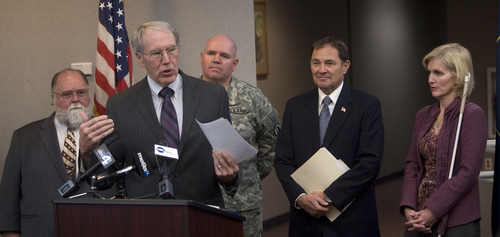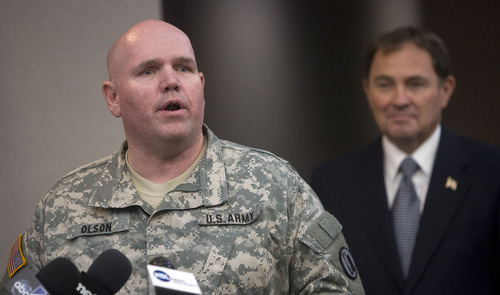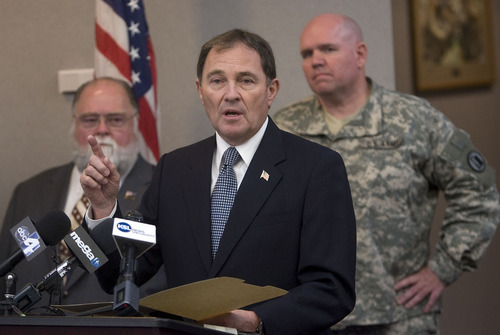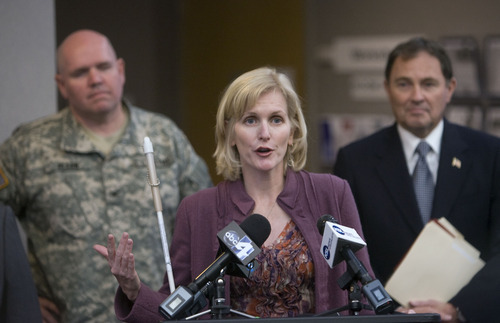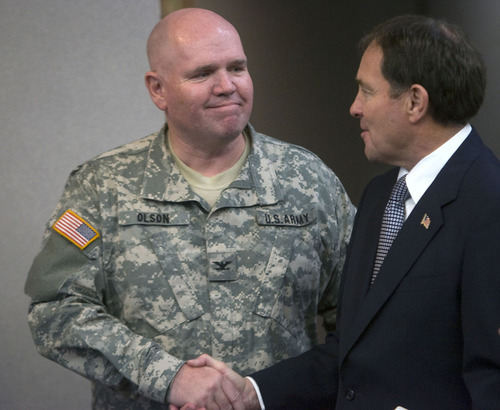This is an archived article that was published on sltrib.com in 2011, and information in the article may be outdated. It is provided only for personal research purposes and may not be reprinted.
Thousands of Utah veterans are expected to find jobs faster thanks to a new program that will help them get professional licenses and college credit for their military training and experience.
"The service and sacrifice our service members make truly merit the program that's being unveiled today," said Colonel Scot Olson of the Utah National Guard.
The "unprecedented" initiative will allow Utah military veterans and Utah National Guard members to match their Military Occupational Specialty code — which designates specific jobs in the military — to civilian occupational codes. That will help them count their service work and training toward a specialized license or educational requirement in the job market.
The effort, called the "Military to Civilian Crosswalk for Accelerated Employment Opportunities Project," was announced by Utah Gov. Gary Herbert and Kristen Cox, executive director of the Department of Workforce Services.
Experience, education and training veterans earned in the military often don't transfer easily into the civilian workforce. Now a soldier who returns home with experience as a surveyor, for example, will receive help applying those hours and training toward receiving his license — allowing him to avoid having to start a training program from scratch.
"We have a great country because of those who serve in the military to protect our freedom," the governor said. "At the end of the day, a skill is a skill."
Utah's institutions of higher education, from Brigham Young University to Utah State University, will work with veterans to identify how their background may equate to credit hours, decreasing the time needed to achieve a certificate or degree. Davis Applied Technology College is one of the schools already participating in that effort.
"We're really interested in getting you on the job as quick as we can," said Kevin Cummings, director of student services.
In August, President Obama told the story of Wyoming combat medic Nick Colgin, who served with the 82nd Airborne in Afghanistan.
Colgin saved the life of a French soldier who was shot in the head, helped 42 people escape from a flooding river and earned a Bronze Star, Obama said.
But when Colgin returned home, he had to take classes to qualify for the duties he had routinely done in Afghanistan.
Obama announced an initiative to align military training so medics can receive academic credit for their service, among other efforts.
But states — which often issue professional licenses and certifications — also must play a role, noted James Schmeling, managing director of the Institute for Veterans and Military Families.
As of October, more than 850,000 veterans were unemployed and the jobless rate for post-9/11 veterans was 12.1 percent, according to the administration. More than one million service members are expected to leave the military between 2011 and 2016.
Finding help
For information on Utah job resources and licenses, go to jobs.utah.gov.
Contacts at Utah colleges and training schools can be found at http://www.higheredutah.org.
Learn about federal efforts to help vets find jobs at http://www.whitehouse.gov/joiningforces/resources.


